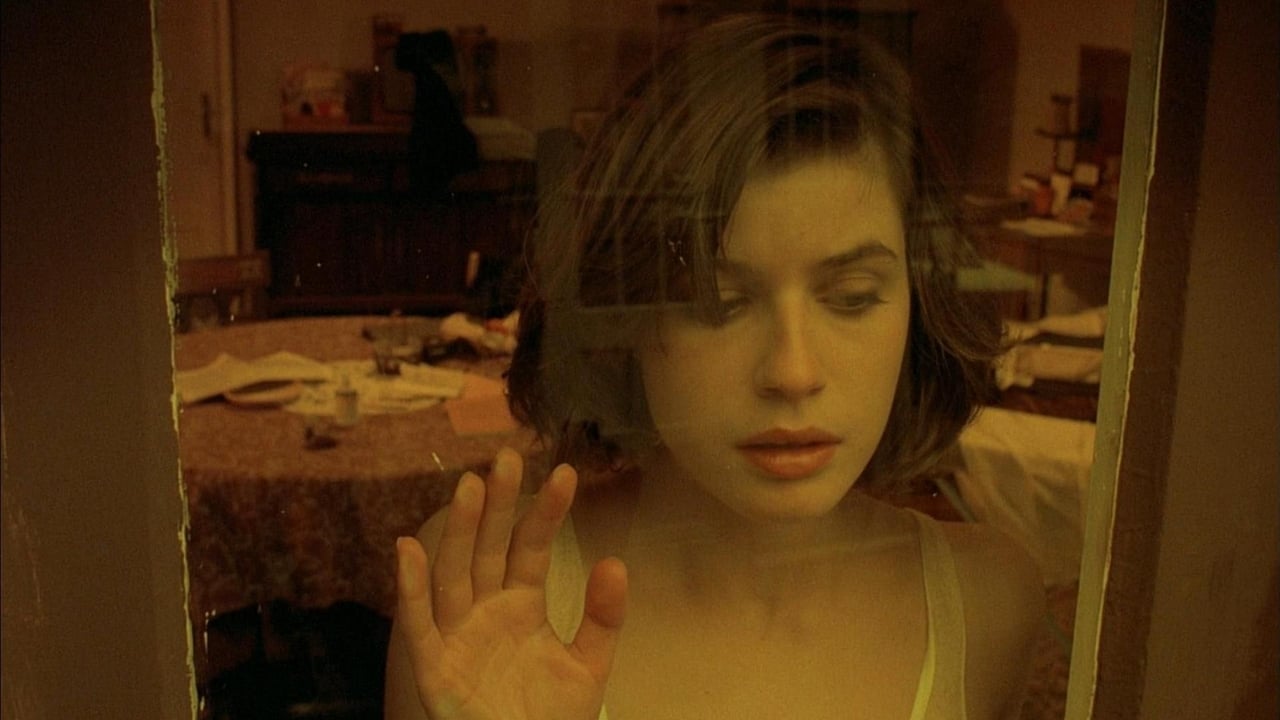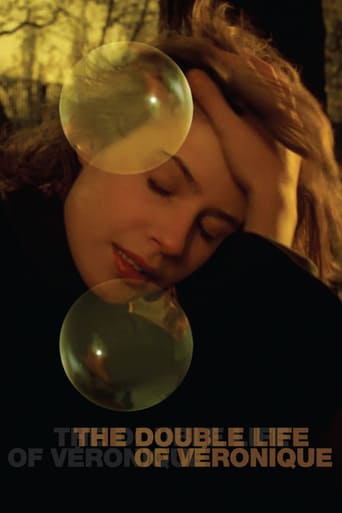

*Possible minor spoilers*Hasn't ever happened that you browse an album with beautiful pictures pleasing your eyes, hearing at the same time beautiful music pleasing your ears and your soul? That's the way I saw this film. It is evident that it is entirely dedicated to Iréne Jacob's beauty, who gives a very good performance, perhaps one of her best, if not the best. And she is beautiful indeed! Zbignew Preisner's music excellently rendered by Elzbieta Towarnicka's voice, completes the beautiful images, by pleasing your ears and your soul. That's all. Do not expect any story, because there isn't any. The film is about two women, the French Véronique living in France and the Polish Weronika living in Kraków, Poland. They look alike like twins, like two drops of water. Véronique seems to feel Weronika, like it often happens with twins, however, they are not. Krzysztof Kieslowski's direction is excellent, perfectly rendering this poem of spectacle and hearing.
... View MoreIt had been a bear finding a properly subtitled version of this film, until the wonders of YouTube finally helped our cause. Irène Jacob's immeasurably understated grace and beauty permeate this film, from the first moments in Krakow where she elevates her voice to angelic proportions, to the second half where she tries to connect with herself in another way.Quickly put, we see two aspects of the same life and experience. Weronika in Poland, a radiant singer with little training but an apparent divine gift, enjoying life with full vigour and finally reaching the dream of become a stage presence, only to be seized from our world by the maker above. It seems unjust, but perhaps she had an inkling of trouble when she spotted her double on a bus slightly before, a jarring experience that nonetheless made her keep her focus.On the other side, in France, we find Véronique, who suddenly abandons singing to teach music to children. She finds herself intrigued by a puppeteer who strikes a cord within her with his marionette show, and slowly comes the realization that she is half of a now incomplete whole.Kieslowsky's brilliance shines in this movie. As we'll see later in his seminal Three Colors, he uses closeups of mundane items to represent stages of reflection or worry. In "Bleu" it is a sugar cube dissolving in Julie's coffee while here we see a teabag immersing itself, emptying its flavour in hot water and thus ridding itself of its duties. Kryztof also perfectly captures Poland in revolutionary moments and the imperilled safety of one individual.Weronika goes from the ecstasy of singing to that of physical ardour to apotheosis whilst her French counterpart regresses from singing to teaching to fleeing to finding, and finally understanding. Jacob is near perfect here, hitting all the right emotive notes. Her almost radiant happiness as she sings hymns at the start, during a torrential downpour, is an unforgettable moment. Her grief at finding herself in the final scenes is also palpable, a bravura performance for the actress.A fine film, deep in starting blocks for other movies from this director, The Double Life of Véronique is a must for anyone who has led more than one life or feels connected to others.
... View MoreThe idea that we all have a double is as old as the hills and as old as that metaphor. Buy one get one free. Irene Jacob is given plenty of footage to show what she is made of. Nudity is right there in the first five minutes. But apart from that and some fine camera work there isn't much to hang on to. Soft porn to lift the tired plot left me cold from the start. Others love this kind of movie. It has all sorts of mysteries and what's going on here moments that passed for movie making when this film was made. It seemed like new ground to some but it wasn't. Just the same old tricks in another box. One scene sums it up. One of the Veroniques tells her father she is in love, in her underwear! 'Anyone I know?' he asks. Most fathers would tell her to go and get dressed.
... View MoreTwo exact look-alikes, the Polish Weronika and the French Véronique, inhabit the world of Krzysztof Kieslowski's memorable The Double Life of Véronique. Both women are played by the same actress, the radiant Iréne Jacob, winner of the Best Actress award at the 1991 Cannes Film Festival. Born on the same day, they have green eyes and dark hair, congenital heart problems, and are talented singers, one a music teacher, the other a choir soprano, though each has a somewhat different personality. By its very nature, the story defies rational explanation and Kieslowski does not offer any, but the premise suggests that the separate self is an illusion, a projection of mind rather than an inherent expression of ultimate reality.Shot in Krakow, Poland and Paris, France, the film is suffused with the stunning cinematography of Slawomir Idziak and a sublime score by Zbigniew Preisner beginning with the song she sung by Weronica at her debut concert in Krakow. Weronica's story fills the movie's first thirty minutes. Weronica's exuberance and childlike innocence are captured in the film's early moments when, after an outdoor choir performance, she remains standing wide-eyed in the pouring rain, looking up at the sky, as the others run for shelter.Strangely though, Weronica tells others about an odd feeling that she is not alone, a feeling that is reinforced when she catches a glimpse of her doppelganger, Véronique, in the center of a Krakow square photographing a political protest demonstration (though she does not pursue her or mention the incident to family or friends). Though Weronica's desire to be a pianist was thwarted in an accident, her beautiful singing voice enables her to win a competition to join a musical company. As the young singer begins to perform her first concert, however, her heart condition sadly prevents her from continuing and the film shifts the remainder of its attention to Véronique.As we first see Véronique, she is in the middle of making love but suddenly bursts into tears without explanation, the incident occurring at the same moment when Weronika suffers serious heart problems at her concert in Krakow. Véronique has given up a promising singing career because she intuitively knows that it is "wrong for her" and instead becomes a music teacher of young children. During this same period she also schedules a cardiogram as if she has had some kind of warning. The film is propelled by the emotions Véronique is experiencing: a strange feeling of being alone in a suddenly uncertain world and an unexplained sense of loss.The mystery deepens when she begins to receive enigmatic packages in the mail from Alexandre (Philippe Volter), a puppeteer whose exquisite marionette performance she has seen and whose gifts are tied to objects from his children's stories. Concluding from listening to a cassette tape that was recorded at the Saint Lazare train station, she meets Alexandre, but her expectations of love are thwarted by his mundane reasons for the subterfuge, although it serves to enhance her sense of closeness with Weronica.Though it is tempting to search for some sort of explanation, The Double Life of Veronique is better off not being analyzed but should be savored for its elusive and impenetrable poetry. If it has any point to make other than its captivating quality as a work of art, it may be that, in life, energy is wasted in trying to figure things out and that the only thing that makes sense is to submerge ourselves in its beauty and succumb to its mystery.
... View More